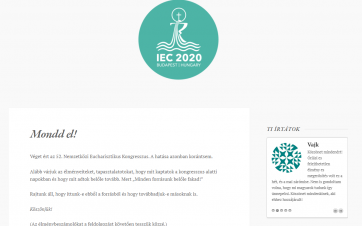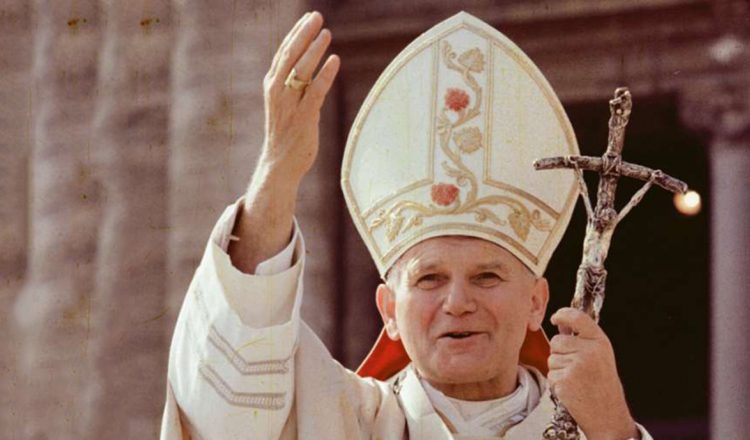
Do not be afraid!

Following the shocking aftermath weeks of John Paul I.’s death, the conclave elected the 58 years old Archbishop of Krakow as Saint Peter’s successor. Everybody felt the importance of the historical event that they were witnessing. The new Pope’s addressing speech, the name he took – that have been well reasoned officially later on- as well as his first ceremonial Papal Holy Mass, in the homily of which his famous sentence would be heard: “Do not be afraid!” – All these marked the starting of a new era. But what this new era would be like, that was the big question everybody was extremely interested in. All of a sudden bookshops storefronts became filled up with his book “Sign of Contradiction” that was written on his Vatican reflections of 1976. The new Pope’s every manifestation voiced the radiating proof of having Jesus Christ in the centre both of his thinking and of his heart.
“It was more than obvious, that a real courageous confessor became the head of the World Church, who was far from being a conformist person, far from any intention to adapt himself solely to his environment,”
moreover, whose life has never been short of experiences that were about the need of remaining faithful to the conviction and to Christ, even when facing the opposition from many and huge external forces, notably because such a faithfulness is good for the world. At the same time this is also good for the ones standing up against Christ and his message, since the joyful tidings are addressed to them as well, and neither of them should be afraid of Christ.
John Paul II.’s entire pontifical program has been perfectly summarised in his first encyclical letter, the Redemptor hominis, published in early March 1979. The encyclical starts with the Pope’s breath-taking message on Jesus Christ. Christ is the Redeemer of Man: of the man both in general, and in its full philosophical sense of the word, namely the redeemer of everyone and of the entire humanity. Indeed it was the new Pope’s real prophetical sensibility on preparing himself for the great jubilee of the Church, to reaching and celebrating the 2000 th anniversary of Jesus Christ’s birth (Redemptor hominis 1.) even during his papacy. For him it primarily meant the very truth: “And the Word became flesh, and dwelt among us” (John 1.14). Already at the very beginning of his first Encyclical the new Pope, who has since been deservedly called great and holy, (Great Saint John Paul) mentions that the Church “has spread to the most distant limits of the earth.” Such a statement, and elsewhere both in his speeches and letters, is likely a sound –probably a mystical- vision or reference. Because the church tradition takes for granted and as one of the signs, a mark of the final times, that the gospel has already been spread around the globe.
But God has entered into the human history. No matter how long
this pilgrimage is going to last, God is coming all along with us,
has become one of us, while remaining the One and only.
“Through the incarnation God has given to human life the dimensions that He intended man to have from his first beginning.” God’s answer was theredemption itself with His eternal love to all the errors of the human intellect.
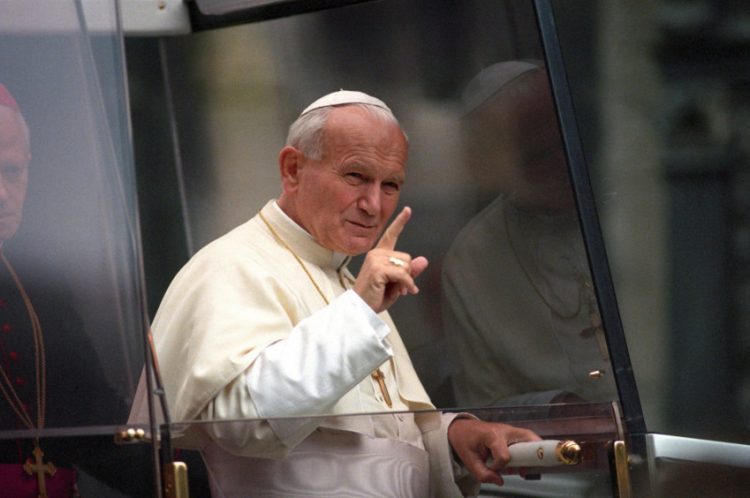
Furthermore, in his first encyclical letter the Polish Pope gives a reasoning as well on his name choice, – now for the second time in the papacy’s history - John Paul. He believes that both John XXIII. and Paul VI. “are such a stage in the history of the papacy which I wish to refer directly as a threshold, from which I intend to continue, in a certain sense together with John Paul I., into the future, letting myself be guided by unlimited trust in an obedience to the Spirit that Christ promised and sent to his Church.” Thus John Paul II. intended to build his entire service to Christ’s will, rather than to the human politics instead. He trusted the Holy Spirit, he confirmed that the Spirit had sent message to the Church through the Second Vatican Council, and repeated the statement of the Lumen gentium, the Council’s divinity provisions: “The Church is like a sacrament or as a sign and instrument of both of a very closely knit union with God and the unity of the whole human race.” The new Pope speaks in the voice of trust and sense of mission, completely obsoleting all kinds of angry and self- devouring church criticism. He explicitly stated: “should the Church itself have a critical sense, it should always remain within limits, otherwise it ceases to be constructive and beneficial, furthermore such criticism does not reveal the truth, love and thankfulness for the grace in which we become sharers principally and fully in and through the Church and in the Church.”(Redemptor hominis 4.). In reality the Church is the messenger of mercy and carries on Christ’s work along the history. The brightness as well as the value that the Church represents, is justified by the Council itself, by applying the Christ merited title “brightness of the nations”, even for the Church itself. This positive attitude oversteps in a straightforward and firm manner all the internal and external offenses against the Church, as well as the exaggerated, untrue and hatred based criticism.
Moreover, both the bishop’s collegiate cooperation and the ecumenical attitude towards the Christian unity are considered as of a relevant direction in Pope John Paul II.’s program for the sake of Peter’s service.
To the question where the Church should be heading for, the answer is obvious: to the direction of Christ, since Christ himself is the source of an intimate union with God and of the entire humanity’s unity.
He underlines again Saint Paul’s words: “For I determined to know nothing among you except Jesus Christ, and Him crucified” (1.Cor. 2.2; Redemptor hominis 7.) He then analyses the mystery of redemption and announces that it is Christ’s secret that means the fundament of the Church’s mission and that of the Christianity. The Pope presents the mission of the current times Church through and in terms of Jesus as a person. The important key point sentence: “The man is the way for the Church….because man, -every man without any exception whatever- has been redeemed by Christ” has already been stated and manifested in the Encyclical (point 14.)
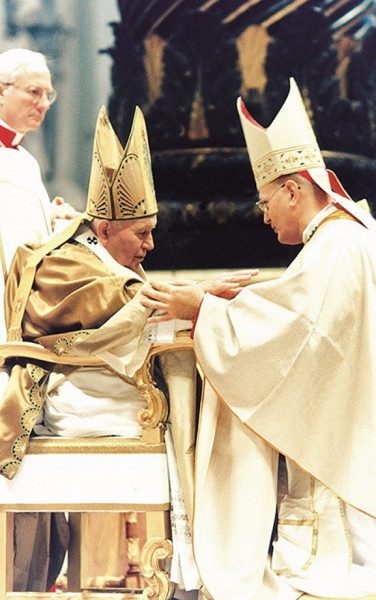
Péter Erdő’s episcopal consecration (6 January 2020 Rome, St. Peter’s Basilica)
Already at the beginning of his papal service, John Paul II. reflected to the great fears of our times, still being very actual topical issues. He mentioned,as a sign of the times, which many are worried of, that man of today seems to be under threat from what he produces, from the result of the work of his hands, that is to say: man turns against himself. This menacing phenomenon he takes as the hardest and most common issue of the modern man’s life. When nowadays one is talking about environmental protection, or that of the created world and the artificial intelligence, they mean the appropriation of the various research results at the cost of mankind, as if the diagnose, that was outlined in John Paul II.’s Encyclical were atomised in parts. Yet, our faith has an answer to the fears: Through Christ the Christians are able to understand the man-related question, and to value the development of our time in a balanced, realistic manner: “We cannot let ourselves be taken over merely by the euphoria or be carried away by one-sided enthusiasm for our conquests, but we must all ask ourselves, with absolute honesty, the essential questions concerning man’s situation today and in the future.”
Out of above questions some has already been then underlined by John Paul II., like the importance of social love, the respect for the rights of others, of every nation and people.
He drew then the attention to the threat of exaggerated nationalism and imperialism as well as to the various degrees of selfishness. He, already at that time commits himself to the requirements of the objective moral order, justice and even more to that of the social love. All these are not reasoned upon some philosophical principles or vox populi, but rather from Jesus Christ’s character, from his “Christ kingship”, since Lord wants to share Christ’s kingly function with the man. (Redemptor hominis 16.)
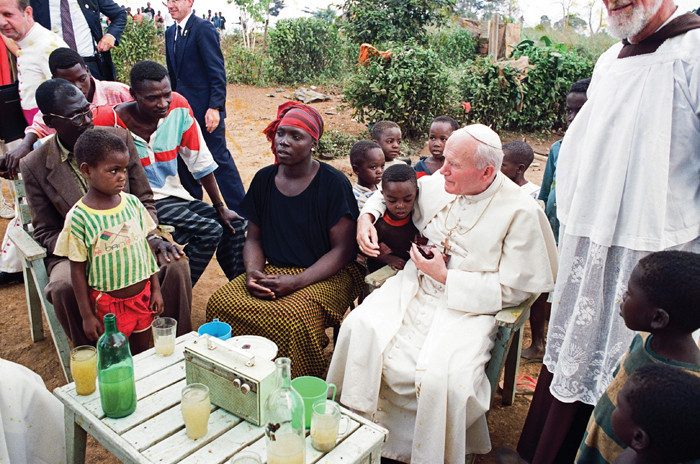
John Paul II. also speaks about the necessity of the solidaritybetween people, as well as about the human rights.
However, he also emphasizes that this is not a pure decision of human bodies, since “the rights of the public power can only be understood on the basis of respect for the objective and inviolable."” The concept of the religious freedom that has been recognised by the Second Vatican Council, is approached by John Paul -alike to the document called Dignitatis Humanae - from a theological point of view and of the natural law: speaking about man’s honour and of his objective rights.
The Holy Pope also considers as a Church’s mission, to face the humankind problems with the power of the truth and love, and for its sake to turn towards Christ and to the secret of redemption with an increased attention.
In light of the Synod’s teaching, he puts into focus “the Church, as a community is also responsible for God’s truth”. He declares that this divine truth is not God’s own and solely one, since even Christ considers it important to tell that the teaching that he is giving is not his, but of the Father’s, who sent him (John’s 14.24). Jesus as a Prophet and a Master hands over this truth. This fidelity is an essential part of the Church’s faith.
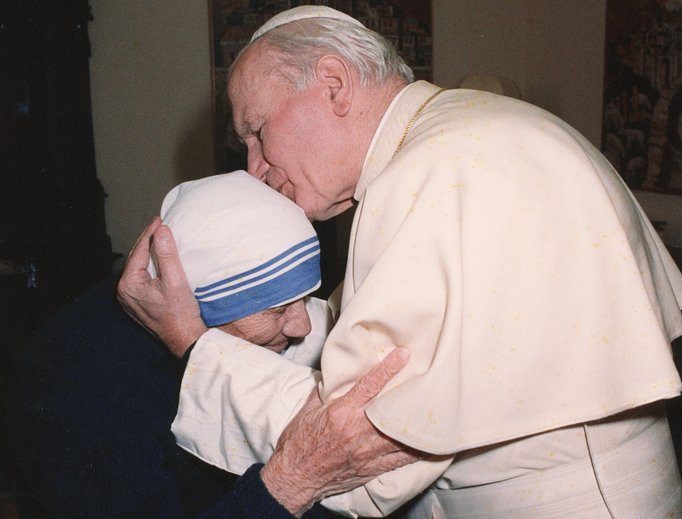
Further on Pope John Paul II. speaks of his prophetical mission, in the execution that of Church joins Christ. Here one can sense the very thought that has already been exposed in one of his earlier discipline: Christ himself and the Church following him are being “the sign of contradictions.”
One can take into consideration a certain pluralism in the methodology of the theological research, but “the work cannot however depart from the fundamental unity in the teaching of Faith and Morals”
The Pope touches the issues of theology, catechism, families as well as the practice of the sacraments, the Eucharist and the Penance. He presents the various donations and services of the Christ believers, finally asking for Virgin Mother’s patronage, while praying together with her for the Holy Spirit, so to be able to witness Christ all along till the end of the world.
This grandiose program and vocation on one hand aroused a great interest in the new Pope’s life story: both his childhood, his student years, his family, his war experiences and his vocation in the communist Poland, all
came into the spotlight. On the other hand, nowadays, at the centenary of his birth and in the light of this very same program, the Pope’s lifetime oeuvre as well as his entire figure have risen into prophetic heights, since he was persistently serving this program with its fresh way of communication all along his 27 years of papacy. Through him the Church has formed, has strengthened in fidelity, in love and in vivid helping attitude towards every human of our times. We ask for Great Saint John Paul II. Pope’s intervention for the sake of our Church, so to be able to put Christ into the centre of our faith and life, while giving Him to the world, since He is the one that man and human are in need of.
Photo: Vatican News
Source: Magyar Kurír
.




